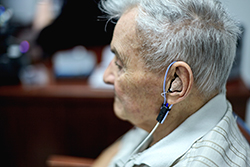|
Disabilities Newsletter
Volume 10, Issue 1, February 2017
We are committed to continuing our service and implementing new ways to keep our readers up-to-date on these critical issues.
Access to Courts for Persons Who are Deaf and Hard of Hearing
By Maya K. Watson
 There are approximately 609,183 deaf and hard-of-hearing persons in the state of Michigan. It is imperative that those who are deaf and hard of hearing have unobstructed access to Michigan courts, forms, and information and that they have the same opportunity to participate in the judicial system as any other individual. There are approximately 609,183 deaf and hard-of-hearing persons in the state of Michigan. It is imperative that those who are deaf and hard of hearing have unobstructed access to Michigan courts, forms, and information and that they have the same opportunity to participate in the judicial system as any other individual.
This article will cover the following three topics:
- Federal requirements for facilitating access to the Michigan court system for those who are deaf or hard of hearing
- Michigan courts' compliance with the Americans with Disabilities Act and ADA Amendments Act of 2008
- A list of references to assist one in making accommodations for the deaf or hard of hearing in the court system
I. Federal Requirements for Facilitating Access to Michigan Court System for Those who are Deaf or Hard of Hearing
 The Americans with Disabilities Act of 1990 (ADA) and the ADA Amendments Act of 2008 (collectively, the "Act") identify courts' responsibilities to provide access to programs and services for citizens with disabilities. Title II of the Act relates to nondiscrimination on the basis of disability in state and local "public entities"—this term includes Michigan courts. On July 15, 2016, Attorney General Loretta Lynch signed a Final Rule to implement the requirements of the ADA Amendments Act of 2008. The Final Rule became effective on October 11, 2016. Congress enacted the ADA Amendments Act to ensure that the definition of "disability" would be broadly construed and applied without extensive analysis. The Americans with Disabilities Act of 1990 (ADA) and the ADA Amendments Act of 2008 (collectively, the "Act") identify courts' responsibilities to provide access to programs and services for citizens with disabilities. Title II of the Act relates to nondiscrimination on the basis of disability in state and local "public entities"—this term includes Michigan courts. On July 15, 2016, Attorney General Loretta Lynch signed a Final Rule to implement the requirements of the ADA Amendments Act of 2008. The Final Rule became effective on October 11, 2016. Congress enacted the ADA Amendments Act to ensure that the definition of "disability" would be broadly construed and applied without extensive analysis.
The U.S. Justice Department's regulations implementing the Act's requirements provide:
"(a)(1) A public entity shall take appropriate steps to ensure that communications with applicants, participants, members of the public, and companions with disabilities are as effective as communications with others . . .
(b)(1) A public entity shall furnish appropriate auxiliary aids and services where necessary to afford individuals with disabilities . . . an equal opportunity to participate in, and enjoy the benefits of, a service, program, or activity of a public entity.
(2) . . . In determining what types of auxiliary aids and services are necessary, a public entity shall give primary consideration to the requests of individuals with disabilities. In order to be effective, auxiliary aids and services must be provided in accessible formats, in a timely manner, and in such a way as to protect the privacy and independence of the individual with a disability.
(c)(1) A public entity shall not require an individual with a disability to bring another individual to interpret for him or her.
(2) A public entity shall not rely on an adult accompanying an individual with a disability to interpret or facilitate communication except [in certain circumstances].
(d) Video remote interpreting (VRI) services. A public entity that chooses to provide qualified interpreters via VRI services shall ensure that it provides:
(1) Real-time, full-motion video and audio over a dedicated high-speed, wide-bandwidth video connection or wireless connection that delivers high-quality video images that do not produce lags, choppy, blurry, or grainy images, or irregular pauses in communication;
(2) A sharply delineated image that is large enough to display the interpreter's face, arms, hands, and fingers, and the participating individual's face, arms, hands, and fingers, regardless of his or her body position;
(3) A clear, audible transmission of voices; and
(4) Adequate training to users of the technology and other involved individuals so that they may quickly and efficiently set up and operate the VRI.
28 CFR 35.160.
II. Michigan Courts' Compliance with the Act
 On September 1, 2015, the Michigan Supreme Court declared that improving public access to Michigan courts, which includes ensuring that persons with disabilities have equal and full access to our court system, is a key priority of the Court. The Michigan State Court Administrative Office (SCAO) is critical to that endeavor as it provides support, in the form of model policies, forms to be used to request accommodations, compliance handbooks, and other resources, to comply with the Act. On September 1, 2015, the Michigan Supreme Court declared that improving public access to Michigan courts, which includes ensuring that persons with disabilities have equal and full access to our court system, is a key priority of the Court. The Michigan State Court Administrative Office (SCAO) is critical to that endeavor as it provides support, in the form of model policies, forms to be used to request accommodations, compliance handbooks, and other resources, to comply with the Act.
The Michigan Supreme Court entered the Administrative Order 2015-5 to enhance compliance with the ADA, the Persons with Disabilities Civil Rights Act, and other Michigan law. Michigan trial courts were deemed compliant with the ADA performance measures and AO 2015-5 if the following occurred by December 31, 2015:
- The chief judge must name an ADA coordinator for the court, who is responsible for coordinating the court's efforts to comply with the ADA;
- Every chief judge and ADA coordinator must complete ADA training;
- The chief judge must name an ADA contact person who is responsible for forwarding requests for accommodation to the ADA coordinator as directed by the chief judge; and
- The court must adopt and submit a local administrative order conforming to Model Local Administrative Order 35, established by the SCAO, to assure that qualified individuals with disabilities have equal and full access to the judicial system.
In addition, under the Michigan's Interpreter Act and Rules, all sign language interpreters who provide interpreter services in Michigan must comply with the Deaf Persons' Interpreter Act and the Qualified Interpreter—General Rules.
In response to developments in federal legislation, Michigan courts have implemented a number of regulations and initiatives to ensure that those with disabilities have free and equal access to the court system, as required under the Act.
III. Additional References
For additional resources, please see below.
- For a list of current Michigan Court ADA coordinators, visit the Trial Court Directory, select your county, and select the ADA Coordinator tab.
- SCAO-approved forms that may be used for requesting accommodations and responding to those requests:
- The Request for Reasonable Accommodations and Response (form MC 70); and
- Review of Request for Reasonable Accommodations and Response (form MC 70).
- Michigan Disability Resources
- Americans with Disabilities Website
- Americans with Disabilities Act Title II Primer
- Frequently Asked Questions About Service Animals and the ADA
- Search Page for American Sign Language interpreters
|